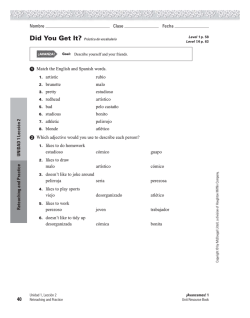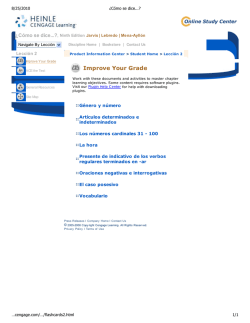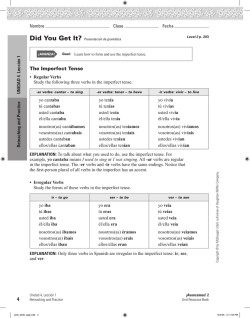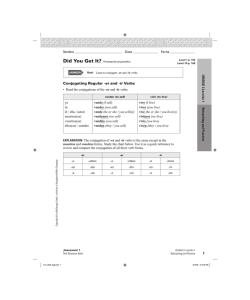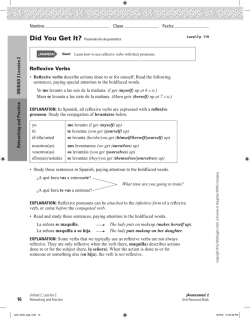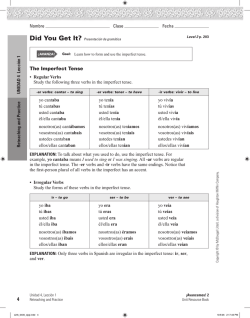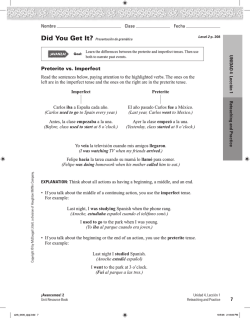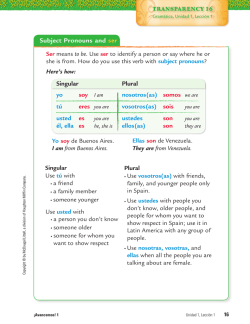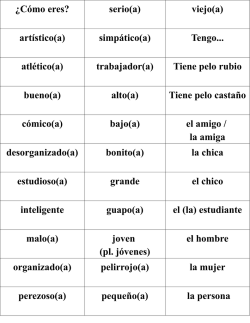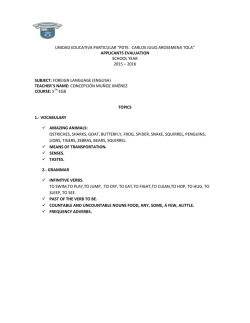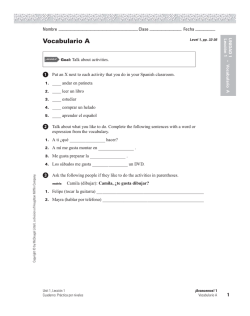
1 Daily Routines Taking a Trip
Nombre Clase Did You Get It? ¡AVANZA! Goal: Fecha Level 1 pp. 410–411 Level 1B pp. 228–230 Presentación de vocabulario Learn words related to daily routines and trips. UNIDAD 8 Lección 1 Daily Routines Daily routines despertarse (to wake up) levantarse (to get up) vestirse (to get dressed) ponerse... (to put on clothes) lavarse la cara (to wash one’s face) cepillarse los dientes (to brush one’s teeth) afeitarse (to shave oneself) ducharse (to take a shower) secarse el pelo (to dry one’s hair) peinarse (to comb one’s hair) maquillarse (to put on makeup) acostarse (to go to bed) dormirse (to fall asleep) el cepillo (brush) Personal care el cepillo de dientes (toothbrush) el champú (shampoo) el jabón (soap) el peine (comb) el secador de pelo (hair dryer) la pasta de dientes (toothpaste) la toalla (towel) Taking a Trip • Usually (Normalmente), we all like vacations (las vacaciones)! Generally (Generalmente), we also all like to take a trip (hacer un viaje). Read and study the following words that will help you talk about being on vacation (de vacaciones). Where to go ¡Avancemos! 1 Unit Resource Book s1rb_0800_dygi.indd 1 Reteaching and Practice Copyright © by McDougal Littell, a division of Houghton Mifflin Company. • We all have our own daily routine from the time we wake up until we go to bed. Here are some Spanish words and expressions that name these activities and the items we need to carry them out. la ciudad (city) el campo (country) How to go en tren (by train) en barco (by boat) Unidad 8, Lección 1 Reteaching and Practice 1 9/14/06 7:36:05 PM Nombre Clase Did You Get It? Goal: Level 1 p. 412 Level 1B p. 231 Práctica de vocabulario Learn words related to daily routines and trips. 1 Choose the object that you use to do the following things. el secador de pelo el champú el jabón la toalla el cepillo el cepillo de dientes 1. wash your hair 2. wash your face 3. brush your hair 4. dry your hair 5. brush your teeth 6. dry yourself 2 Which activity do you do... 1. before going to bed? levantarse dormirse cepillarse los dientes 2. in the morning? despertarse acostarse dormirse 3. after a shower? lavarse la cara secarse levantarse 4. after being in the wind? afeitarse peinarse acostarse 5. before going to a party? vestirse acostarse dormirse 6. after going to bed? maquillarse levantarse dormirse 3 How do these people travel and where do they go? Follow the model. Modelo: 2 Enrique / el campo / tren Enrique hace un viaje al campo en tren. 1. Mario y Luisa / la ciudad / coche 2. los estudiantes / España / barco 3. Mi familia y yo / el campo / tren Unidad 8, Lección 1 Reteaching and Practice s1rb_0800_dygi.indd 2 Copyright © by McDougal Littell, a division of Houghton Mifflin Company. Reteaching and Practice UNIDAD 8 Lección 1 ¡AVANZA! Fecha ¡Avancemos! 1 Unit Resource Book 9/14/06 7:36:08 PM Nombre Clase Fecha 4 Which items do you need for each routine? lavarse la cara o ducharse 2. cepillarse los dientes 3. lavarse el pelo 4. secarse el pelo 5. peinarse 6. secarse después de ducharse UNIDAD 8 Lección 1 1. normalmente maquillarse acostarse la cara jabón la toalla los dientes champú 1. Todas las noches me gusta lavarme 2. Me gusta cepillarme 3. Compro un 4. A Luisa le gusta 5. Rogelio quiere 6. Prefiero secarme el pelo con Copyright © by McDougal Littell, a division of Houghton Mifflin Company. nuevo para lavarme el pelo. antes de salir. porque está cansado. Me lavo la cara con un , no con el secador. especial. 6 Decide whether each statement is logical (L) or illogical (I). 1. A Susana le gusta levantarse inmediatemente después de despertarse. L I 2. Lola prefiere lavarse la cara con el secador de pelo. L I 3. Jorge quiere afeitarse después de levantarse. L I 4. Los chicos quieren cepillarse los dientes con la toalla. L I 5. A ella le gusta lavarse la cara, cepillarse los dientes y acostarse. L I 6. Las chicas prefieren maquillarse antes de lavarse la cara. L I 7 Write three things you generally like to do every day and the order in which you like to do them. Follow the model. Modelo: Generalmente me gusta levantarme a las siete y media. Me gusta lavarme la cara antes de vestirme. Me gusta ponerme la ropa antes de peinarme. ¡Avancemos! 1 Unit Resource Book s1rb_0800_dygi.indd 3 después de comer. me gusta afeitarme en la mañana. 7. 8. . Reteaching and Practice 5 Complete each sentence with a word or phrase from the box. Unidad 8, Lección 1 Reteaching and Practice 3 9/14/06 7:36:11 PM Nombre Clase Fecha Level 1 pp. 412, 421, 424 Level 1B pp. 231, 241, 245 ¿Recuerdas? • Review the preterite tense of hacer (to do, to make) and four expressions using the verb. hacer la cama (to make the bed) hacer la tarea (to do homework) hacer un pastel (to make a cake) hacer un viaje (to take a trip) hacer (to do, to make) hice hiciste hizo hicimos hicisteis hicieron • Review the names of these rooms in a house. el baño (the bathroom) el cuarto (the bedroom) la cocina (the kitchen) la sala (the living room) • Read the time shown on these clocks. 11 12 1 2 10 9 3 4 8 7 6 5 11 12 1 2 10 9 3 4 8 7 6 5 11 12 1 2 10 9 3 4 8 7 6 5 11 12 1 2 10 9 3 4 8 7 6 5 11 12 1 2 10 9 3 4 8 7 6 5 11 12 1 2 10 9 3 4 8 7 6 5 Son las diez. Son las once y media. Son las siete menos veinte. Son las once y diez. Son las dos y cuarto. Son las doce. Copyright © by McDougal Littell, a division of Houghton Mifflin Company. Reteaching and Practice UNIDAD 8 Lección 1 Preterite Of Hacer, Chores, Telling Time Práctica 1 Translate the following sentences into Spanish. 10 1. I took a trip by train at 7:30. 2. Ana made the bed at 10:40. 3. You did your homework at 6:20. 4. We swept the kitchen floor at 4:10. 5. You watched TV in the living room at 9:00. 6. He cleaned the bathroom at 7:15. Unidad 8, Lección 1 Reteaching and Practice s1rb_0800_dygi.indd 10 ¡Avancemos! 1 Unit Resource Book 9/14/06 7:36:43 PM Nombre Clase Fecha Level 1 p. 414 Level 1B p. 233 ¿Recuerdas? Direct object pronouns Voy a usar el secador. (I am going to use the dryer.) Voy a usarlo. or Lo voy a usar. UNIDAD 8 Lección 1 • Read the following sentences, paying attention to the boldfaced words. Then, review the chart below that contains all of the direct object pronouns in Spanish. (I am going to use it.) Singular Reteaching and Practice Direct object pronouns Plural me (me) nos (us) te (you familiar) os (you familiar) lo (you formal/him/it) los (you formal/them masculine) la (you formal/them feminine) las (you formal/them feminine) Práctica Copyright © by McDougal Littell, a division of Houghton Mifflin Company. 1 Write the direct object pronoun that corresponds to each noun. The first one is done for you. 1. la ciudad la 6. tú y yo 2. el campo 7. los chicos 3. el cepillo 8. el peine 4. las toallas 9. tú, Julia 5. el jabón yo 2 What did Ana take on vacation? Follow the model. Modelo: ¿Llevó la pasta de dientes? 1. ¿Llevó el cepillo de dientes? 2. ¿Llevó el secador de pelo? 3. ¿Llevó la chaqueta? 4. ¿Llevó a su gata? 5. ¿Llevó las toallas? 6. ¿Llevó el champú? 7. ¿Llevó su jabón favorito? 8. ¿Llevó a sus amigos? ¡Avancemos! 1 Unit Resource Book s1rb_0800_dygi.indd 11 10. Sí, la llevó. Unidad 8, Lección 1 Reteaching and Practice 11 9/14/06 7:36:46 PM
© Copyright 2026
